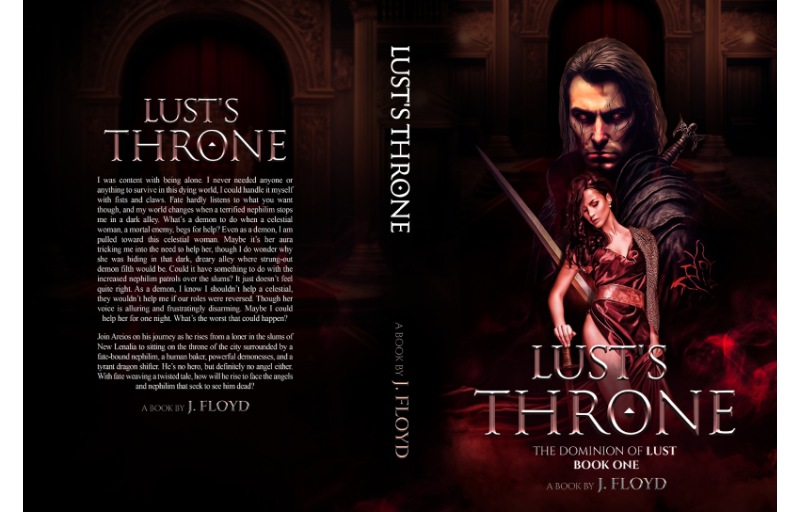‘Lust’s Throne’s’ Captivating Dynamics of Fate and Destiny

Few topics in literature hold readers’ attention as much as fate and destiny. Frequently entwined with magic and mystery, these ideas advance stories and compel readers to turn the pages to understand their meaning. This book, written by a mysterious author only known as the scribe of otherworldly tales, makes fate and destiny real, concrete forces that mold the lives of its protagonists. Readers are pulled into a world where fate and free will are blurred, and destinies are entwined in profound and surprising ways right from the first page.
As we travel with the protagonists, we learn that their outcomes are the result of the decisions they make and the obstacles they face rather than being predestined. In this story, fate is an active player rather than a passive force that directs characters toward their final destinations while allowing for personal initiative and development. We are encouraged to consider our contributions to determining the path of our lives and to investigate the nuances of fate and destiny through this lens.
Revealing the Mysteries of Destiny
Areios’s mysterious character sparks the story’s examination of fate’s complex mechanisms. Readers are dragged into a web of mystery and doubt as they go with him on his search for self-discovery, reflecting his process of solving the puzzles surrounding his background. No matter how minor the revelation, it moves him closer to seeing how deeply entwined he is with the forces at work.
Through Areios’s eyes, we see the enormous influence fate can have on a person’s life, how it can mold their identity and direct their behavior in ways they never would have thought possible. Fate is a live, breathing force that molds Areios’s existence, not just a backdrop against which the story is told. As we learn more about his narrative, we are reminded of fate’s ability to test and uplift people, leaving a lasting impression on those who dare to accept its secrets.
The Call of Destiny
His connection with the Nephilim serves as a compass on this voyage predetermined by fate, stabilizing him in the face of chaos that could easily overwhelm him. Their bond, formed in the furnace of misfortune, is a ray of hope that illuminates the way ahead and gives him the courage to take on whatever obstacles lie ahead. His steadfast tenacity and unwavering drive in the face of overwhelming circumstances are proof of the strength of destiny’s call.
Through his struggles, he discovers that fate is a gift to be accepted rather than a burden, allowing him to reach his full potential and carve out a unique route. In this novel, destiny’s call is not just a cry to action but also a transformational force that drives the protagonist toward his ultimate goal, forming his personality and leaving a lasting impact on future generations.
The Interplay of Free Will and Fate
Free will dances alongside fate, altering the decisions people make and their paths. Characters wrestle with this delicate balance as they struggle to protect the people they love and fulfill their destiny in the face of turmoil. His choices, which are impacted by fate and free will, have serious repercussions, highlighting how difficult his journey is.
As he navigates the perilous landscape of his fate, he faces innumerable decisions that could change the trajectory of his life. Still, he doesn’t want to be just a pawn in the game of fate and is unwavering in his will to control his destiny in the face of uncertainty. Through his activities, he fully emerges as the embodiment of pure free will, propelled by a strong blend of agency and resolve.
Love’s Significance in Fate
‘Lust’s Throne’ is centered around a deep love that transcends time and space. The bond between Areios and his Nephilim friend gives them hope in the face of the impending darkness that seems to engulf them. Their enduring friendship, developed through hardship, is the impetus for Areios’s journey toward self-realization and atonement. Love appears to have the ability to overcome even the most difficult challenges and leave its mark on destiny.
Accepting the Tapestry of Fate
As his trip progresses, he learns that fate is a tapestry that should be welcomed rather than something to be dreaded. Every detour he takes on his journey brings him one step closer to his final goal. Similarly, readers are asked to consider how fate functions in their own lives and whether they are only passive recipients of fate’s will or actively involved in determining it.
The Redemptive Power
This presents a message of redemption and hope amidst the mayhem. Driven by the conviction that even the most difficult pasts can be overcome, Areios embarks on a path of self-discovery and personal development. He discovers thru his hardships that fate is a force for good, not a prison, that will lead him to a better future. This is how ‘Lust’s Throne’ reminds us that there is always hope for salvation, no matter how hopeless the situation.
Conclusion
‘Lust’s Throne’s’ delicate dance between fate and destiny reflects the intricacies of our existence. Following Areios and his friends on their turbulent trip forces us to consider the age-old issues of fate and meaning that speak to all of us. We are reminded by their hardships and victories that fate is a dynamic, ever-evolving force that changes our lives in unforeseen ways rather than a fixed destination. Accepting the unknown allows us to become open to limitless opportunities. We also find strength in the realization that fate always finds a way to lead us toward the light, even in the darkest of circumstances.
Readers are encouraged to consider their journeys and to welcome the transformative power of destiny with open hearts and minds as they become fully engrossed in the fascinating world of “Lust’s Throne.”